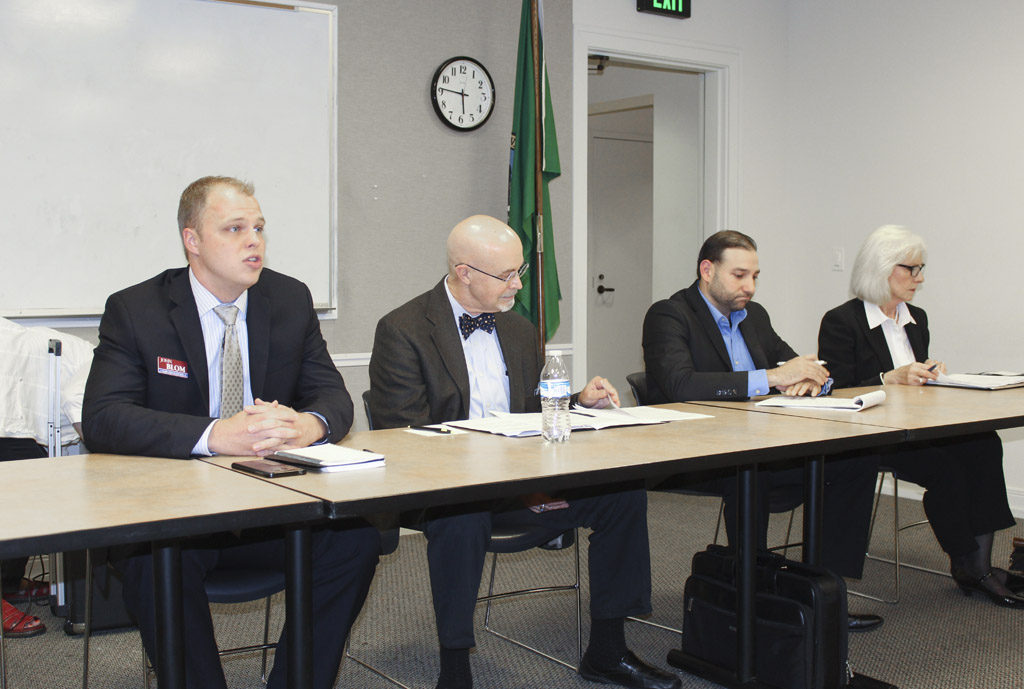CAMAS — Although two of the six candidates invited to participate in a candidate forum Wednesday evening at the Camas Library were not present, four other candidates spent about two hours answering questions from the Neighborhood Association Council of Clark County (NACCC) and from people in the audience.
Candidates in attendance at the Oct. 5 forum included Republican John Blom, who is running for the Clark County Council District 3 position, Democrat Roman Battan and Republican Eileen Quiring, who are both running for the Clark County Council District 4 position, and Democrat Jim Moeller who is running for state representative in the state’s third Congressional District.

Democrat Tanisha Harris, who is running against Blom for the Clark County Council District 3 position, and Republican Congresswoman Jaime Herrera-Beutler, who is running against Moeller, were not present.
Questions from the NACCC covered a variety of issues, including the issue of traffic congestion between Oregon and Washington, the county’s Home Rule Charter, the Affordable Care Act, staffing problems in the Clark County Sheriff’s Office, immigration reform, budget priorities, affordable housing and more.
The three candidates running for Clark County Council positions were all asked the same questions, while Moeller was asked a different set of questions pertaining more to statewide issues.
Moeller was asked how he would address the issue of traffic congestion between Oregon and Washington. He started his answer by explaining that he’s thought a great deal about traffic because he’s stuck in it every day himself.
“In 2015, we spent $11.5 billion on transportation infrastructure across the state,” Moeller said. “Without the I-5 bridge being replaced, we’re at a disadvantage. Replacing the bridge is the best thing we can do when we’re thinking about family wage jobs.”
The County Council candidates addressed the subject of the Home Rule Charter and what aspects of it they think need to be changed or need clarification.
Quiring said she thinks that it’s good that the county now has five representatives because of the Home Rule Charter. She said she thinks it will continue to be important for the council to work closely with executive management.
Blom emphasized that the Charter has only been in place for less than a year, and said he believes good policy is made over the course of observing how things function.
“I think 2020 seems like a good time to start looking at what needs to be changed (or clarified) with the Charter,” Blom said.
Battan said he likes the fact that the Charter separates the legislative powers from the executive powers. He said he would like to see more in place regarding how councilors treat county staff.
“We don’t want the taxpayers to be paying for lawsuits,” Battan said. “We need more policies for punitive measures and a way to better handle mitigation.”
Candidate information
For more specific information on each of these candidates, visit their individual websites:
Jim Moeller:
www.jimmoeller.org
Jaime Herrera-Beutler:
http://herrerabeutler.house.gov/
Tanisha Harris:
http://tanishaharris.nationbuilder.com/
John Blom:
http://johnblom.com/
Eileen Quiring:
http://www.electeileenq.org/
Roman Battan:
http://www.electromanbattan.com/
Moeller was asked to address the issue of how he would ensure that all people have access to affordable, nondiscriminatory health coverage. He responded by saying he would not repeal the Affordable Care Act, but that it does need to be reformed.
“It’s (the ACA) not a perfect thing,” Moeller said. “We must gradually work towards a single payer system.”
After answering a set of four questions from the NACCC, candidates were able to answer some questions posed to them from those in the audience at the forum. One question asked was, “what does promoting general welfare mean to you?”
Battan said that to him, promoting general welfare meant balance.
“We have to be good stewards,” he said. “We have to make sure we are using our resources as best we can. It’s the idea of bringing humanity back to government.”
Moeller echoed Battan’s idea of balance, and also stressed that general welfare has a lot to do with business, people’s jobs and people’s ability to have and maintain employment.
Blom described promoting general welfare as also remembering to think about whose voice is not getting heard.
“We have to think about the greater good and how our decisions affect everyone,” Blom said.
Quiring used the example of the Declaration of Independence to describe her thoughts on promoting general welfare, pointing out the rights of the people to have life, liberty and the pursuit of happiness (and property).
“I believe promoting the general welfare has to do with allowing our people to have those unalienable rights of life, liberty, pursuit of happiness and property,” Quiring said. “We need to hear from our constituents about what they need.”
The candidates were also asked about their positions on aging in place in Clark County, and what they would do to protect vulnerable adults and seniors.
Quiring stated that she would continue to help pass good policy in order to protect aging adults, and also talked about making sure people were able to have accessory dwelling units on their property for aging family members.
Battan addressed the issue by saying that seniors are a very important part of the community who often get left behind. He said he doesn’t really agree with the idea of accessory dwelling units, as this simply puts senior citizens in essentially a “tiny home.” Battan said he would try to sit down with a coalition of seniors and find out what issues they need addressed.
Moeller agreed that the first thing that needs to be done in regards to the aging population is that seniors need to be asked what’s going to be useful to them and where they need help.
Blom said he believes one of the biggest challenges of taking care of the senior population is education. He said he believes there needs to be better education for all people who might come into contact with seniors, and people need to be aware of different warning signs and ways to help.




